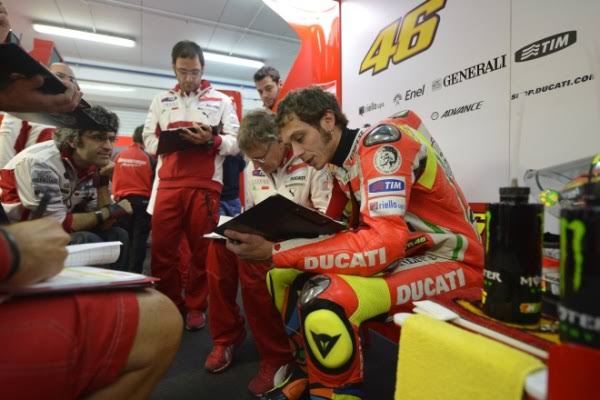
Valentino Rossi’s Tenure with Ducati ‘Was a Great Disappointment’, Admits Claudio Domenicali…
Claudio Domenicali, the CEO of Ducati Motor Holding, has openly admitted that Valentino Rossi’s time with the Italian manufacturer was a “great disappointment” for both the company and the legendary rider. Despite the immense expectations surrounding the partnership, which began in 2011, the collaboration never produced the desired results on the racetrack, leaving both parties with a sense of unfulfilled potential.
Rossi, one of the most successful and beloved figures in MotoGP history, made the high-profile switch from Yamaha to Ducati in 2011, in a move that surprised many. The decision was seen as a potential turning point for Ducati, who were eager to establish themselves as a dominant force in MotoGP. Rossi had previously achieved unparalleled success with Yamaha, including multiple world championships, and Ducati hoped his expertise and star power would help them close the gap to the top of the grid.
However, the reality was far from the dream scenario both Rossi and Ducati had envisioned. Despite the talent of both Rossi and the Ducati engineers, the team was unable to consistently challenge for victories or even podiums during his two-year tenure. Rossi’s best finish came in 2012, when he secured a solitary second-place finish at the Malaysian Grand Prix. This was a far cry from the dominant performances he had become accustomed to with Yamaha.
The primary challenge was the Ducati Desmosedici GP, which was not suited to Rossi’s riding style. The bike’s design, particularly its unique chassis and engine configuration, posed a series of challenges for the veteran rider, who struggled to adapt. The Ducati was notoriously difficult to handle, and its lack of stability and confidence in corners prevented Rossi from performing at his best. Additionally, Rossi’s frustration with the bike grew as he failed to gel with the team and engineers, leaving him searching for solutions that never quite materialized.
In an interview reflecting on the period, Domenicali did not hold back in his assessment of the partnership. “It was a great disappointment, for Valentino and for us. We had high hopes, but the results didn’t meet our expectations,” he confessed. “We all wanted to see Valentino winning races and challenging for the championship, but it just didn’t happen. It was a difficult period for both parties.”
Despite the disappointing results, Domenicali was quick to emphasize the valuable lessons that Ducati learned during Rossi’s time with the team. “We gained a lot of knowledge during those years,” he explained. “Valentino is one of the greatest riders of all time, and working with him helped us understand more about bike development, especially in terms of what works and what doesn’t at the highest level.”
Rossi himself has been candid about his time with Ducati, acknowledging that it was a challenging period in his career. In interviews following his departure from Ducati at the end of the 2012 season, he admitted that the lack of competitive machinery played a significant role in his inability to replicate his previous successes. He later returned to Yamaha, where he regained some of his form, but his stint with Ducati remained a major talking point in MotoGP history.

Ultimately, Rossi’s time with Ducati is often seen as a period of “what could have been,” where the potential for success was overshadowed by the inherent difficulties of adapting a high-performance motorcycle to the rider’s preferences. Although the collaboration failed to deliver the desired results, the lessons learned from that era have undoubtedly contributed to Ducati’s later success in MotoGP, particularly with riders like Andrea Dovizioso and current champion Francesco Bagnaia.
For Rossi, the Ducati chapter was a humbling experience, but it did not tarnish his legacy. He would go on to achieve further success in MotoGP, cementing his status as one of the greatest riders in the sport’s history. For Ducati, the period marked a tough but essential step in their evolution, as they worked tirelessly to improve their bikes and eventually achieve the dominance they enjoy today.
In conclusion, Valentino Rossi’s time at Ducati may not have been the fairytale many had hoped for, but it remains a crucial part of both his career and Ducati’s journey in MotoGP. As Domenicali aptly put it, it was a period filled with “great disappointment,” but it was also one that provided valuable insights and laid the groundwork for future triumphs.
Leave a Reply